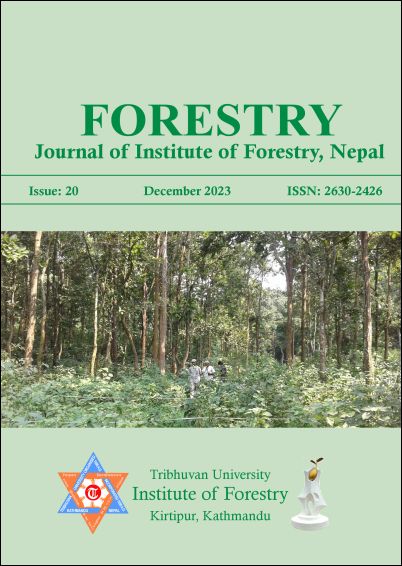Effect of Various Bamboo Species on Soil Properties in Pani Kholsi Micro-Watershed, Nepal
DOI:
https://doi.org/10.3126/forestry.v20i1.64275Keywords:
Bamboo species, Eco-restoration, Soil properties, Degraded landAbstract
The biological characteristics and growth habits of bamboo enormously contribute to improving physical and chemical properties of soil. This study focuses on understanding the influence of four bamboo species on soil properties: Bambusa tulda, Bambusa balcooa, Dendrocalamus strictus and Bambusa nutans subsp. cupulata. For this, 15 soil samples were collected from open space (degraded land site) and bamboo species plantation areas in Pani kholsi micro-watershed and analysed in laboratory to determine soil pH, organic carbon content, available Nitrogen, Phosphorus and Potassium in soil. The soil pH decreases under all bamboo species compared rather than in open space. Lowest soil pH was recorded in the surface soil of B. balcooa and D. strictus. The organic matter content was the highest in surface soils under B. tulda (1.68%) and the lowest in the soil of open space (0.08%). Similarly, availability of Nitrogen (0.14%) and Phosphorus (4.27 kg/ha) was the highest in surface layer soil under B. tulda but the lowest (0.1% and 0.71 kg/ha respectively) in open space. And, the surface soil under B. tulda had much higher potassium content (68.4 kg/ha) than the soil in open space (8.88 kg/ha). Overall, the soil chemical properties under B. tulda were found to be better than under other species.
Downloads
Downloads
Published
How to Cite
Issue
Section
License
© Tribhuvan University, Institute of Forestry




